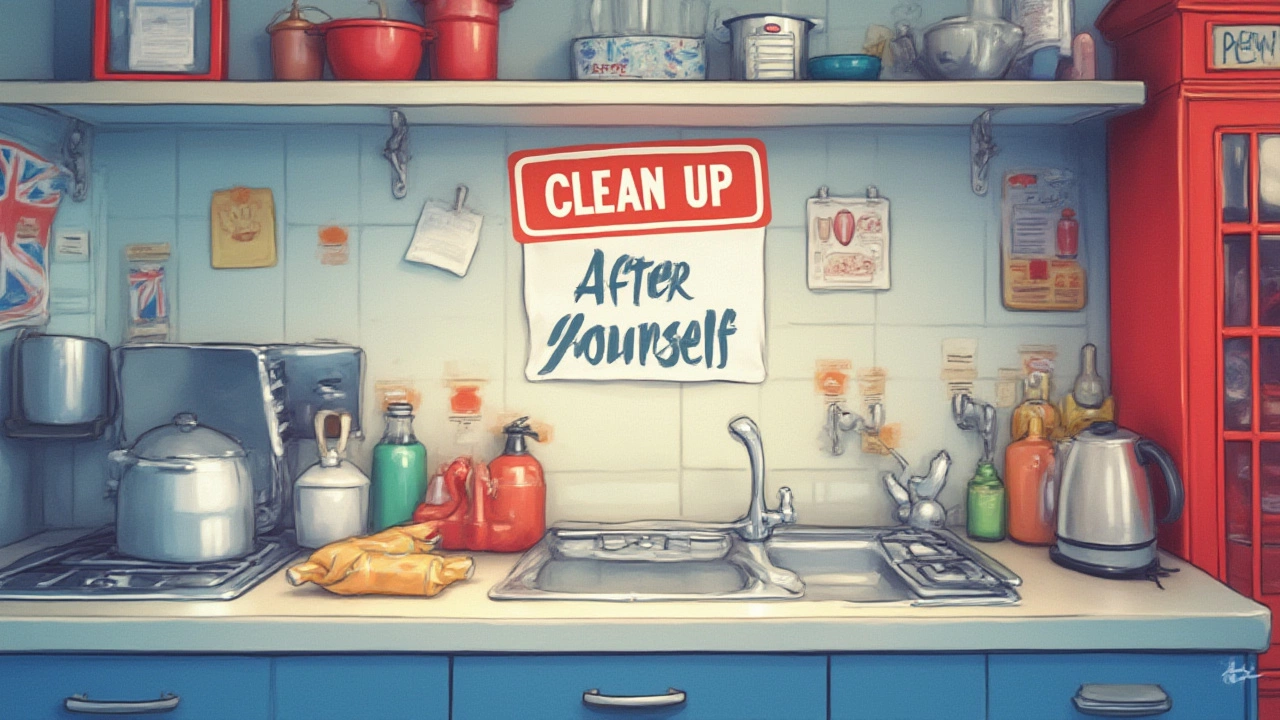Ever noticed how a grimy keyboard or messy desk can get under your skin? Turns out, office cleaning isn’t just a matter of pride or taste—there’s real science showing uncluttered, hygienic spaces boost both employee health and productivity. But the million-pound question lingers: who, exactly, should tackle the job of keeping the office spick and span?
The Psychology and Value of a Clean Office
Imagine your first day at a new job. You walk in, coffee in hand, and see half-eaten sandwiches on the table, dust bunnies under every chair, and bins threatening to erupt. Not exactly inspiring, right? Studies show that 57% of UK office workers say their motivation dips when their workspace is dirty or cluttered. Beyond the yuck factor, there’s the risk: office workspaces can house more germs than a household toilet seat. For example, the average desk harbours 400 times more bacteria—crazy, but true. That means every unwashed mug on a shared counter, every sticky doorknob, every old tissue—these aren’t just eyesores, but potential sources of illness.
But why does it matter so much? For one, sick days cost UK businesses about £18 billion annually, with workplace hygiene playing a sneaky role. Employees facing a messy or unsanitary environment are 12% more likely to take sick days. A messy office can also keep stress levels high and morale low, even if you’re not a neat freak by nature. If you’re into stats, this one will raise eyebrows: 72% of workers admit they judge colleagues for their tidiness. So whether we like to admit it, cleanliness shapes how we see each other.
And don’t underestimate the role of scent. Researchers found that subtle lemon or pine scents linked to cleanliness actually made office workers more likely to tidy up after themselves. A clean environment subtly nudges everyone to take better care—not just of themselves, but also of shared resources and mutual spaces. Clearly, office cleaning goes far beyond appearances.
So, knowing it really matters, how do we decide who does the cleaning?
| Office Area | Average Bacteria Count (per sq. inch) | Recommended Cleaning Frequency |
|---|---|---|
| Keyboard | 3,295 | Daily |
| Desk Phone | 25,127 | Daily |
| Office Desk | 21,000 | Weekly |
| Breakroom Sink Handle | 2,483 | Daily |
| Toilet Seat | 49 | Daily |

Who Should Really Clean the Office?
If you glare at the overflowing bin like it personally betrayed you, you’re not alone. The politics around who empties bins or wipes the microwave can quietly fuel office drama. So who, fair and square, should carry out this not-so-glamorous work?
The truth is, no one-size-fits-all answer works. Some smaller companies take the DIY route, with employees each chipping in—maybe a daily rota, or a tidy-as-you-go policy. This works great for those with only a handful of staff. It’s direct, it builds community… but it’s also risky. Neil from finance might never scrub the fridge, while Sarah from HR has had enough of wiping down meeting rooms. Left unchecked, this approach can breed resentment, especially if a few team members regularly skip their turn. I’ve seen it myself: arguments break out, “fridge rage” is real, and the cleanest people become unofficial ‘office parents’—while others coast along.
Then there’s the professional cleaning service option. This is the route most medium and large UK businesses take, for good reason. They hire cleaning staff, sometimes in-house, sometimes through an agency—so the office is cleaned each evening or morning before workers arrive. These pros handle everything from vacuuming to disinfecting doorknobs, freeing employees to focus on work. If you’re in an open-plan office in London, there’s a good chance this is what’s happening even if you don’t see it.
But does that mean employees are totally off the hook? Not quite. Even with cleaners on the payroll, most places still expect people to keep their own desks tidy and dishes rinsed. Some companies spell this out in contracts or employee handbooks. Others rely on gentle reminders—and a whopping 40% of workers in the UK admit they ignore them. The expectation is clear: deep cleaning is a pro’s job, but day-to-day messes are everyone’s responsibility.
Certain jobs and industries have stricter standards. Tech companies, for example, are notorious for snack-laden desks and late-night pizza crusts, but their IT equipment means spills and crumbs can mean costly repairs. On the other hand, health clinics or food-based businesses often require staff to be trained in official hygiene procedures—no asking Gary from marketing to bleach a sink unless he knows what he’s doing. Legal requirements in these fields mean proper cleaning is a role, not a favour.
Remote offices or hybrid spaces have their own quirks. With people using hot desks or rotating in and out, the lines blur. Who wipes down the workstation at the end of the day? Smart companies now provide antibacterial wipes and put up posters: “Please leave this desk as you found it.” It’s not foolproof, but it’s a start. When the pandemic turned everything upside down in 2020, many businesses brought in more robust cleaning regimes and clearer expectations for shared surfaces. Suddenly, everyone was more aware of germs—and who was doing their bit.
At the heart of the debate is fairness and shared responsibility. If the cleaning falls only to women or junior staff, resentment bubbles up fast. Research found that in mixed-gender offices, women do 18% more unpaid cleaning tasks on average—a stat that should make any workplace stop and think. Some modern offices try to level the playing field by keeping track of cleaning duties, even gamifying it with rewards for tidy teams.
Even if you outsource deep cleaning, the best workplaces foster an attitude that small, everyday messes are up to everyone. A balance between pro cleaners and in-house habits is where most offices land. Skipping either piece starts the spiral back to cluttered chaos—the exact place we’re all trying to avoid.

Smart Solutions for Clean and Happy Workspaces
You’ve probably seen the cheeky signs by the kettle: “Your mum doesn’t work here—please clean up after yourself!” While those can raise a smile (or the odd eye roll), the secret to a genuinely clean office goes way beyond guilt trips. A few smart tweaks to set-up and culture can shift cleaning from a groan-worthy chore into an easy part of daily office life.
First, set clear expectations. Put it on paper—yes, in black and white. Whether it’s in the staff handbook, posted above the sink, or explained when new folks join, spell out who does what and when. “Tidy desk every Friday at 3pm,” or “Wipe your desk at the end of your shift” works better than hoping someone will step up. If people know what’s needed, there’s less guesswork and less finger-pointing.
Next (and this sounds silly, but just works): make cleaning supplies super visible and within arm’s reach. Stash antibacterial wipes, bin bags, washing-up liquid, and paper towels in every kitchen and near shared printers. When someone sees a smudge or spill, they can fix it in seconds. No trek to a locked basement cupboard, no elaborate sign-out sheet—just clean as you go. At my office in Bristol, I keep a spray bottle in a drawer next to the dog’s lead. The fewer barriers, the less grumbling.
Technology makes tracking shared tasks easier, too. Some teams use calendar reminders or sticky notes stuck to PC screens (the digital kind, not the old-school paper ones). There are even office cleaning apps now—one lets you ‘claim’ tasks like emptying the bin, then scores points and offers up the occasional prize: free coffee, half-day off, or even (no joke) a trophy for the tidiest desk. People are way more willing to pitch in when they’re recognised, even if it’s just a bit of friendly banter.
Here’s one for the data lovers: companies whose staff rated workplace cleanliness above 8 out of 10 saw a 13% rise in staff retention compared to similar-sized firms with mid-range hygiene scores. Keeping the office clean could actually help keep your best people. That’s not all—one study from Oxford University found that happy workers are 13% more productive, with physical environment named as a key factor.
Small touches help. Schedule a quarterly “clear-out day” where everyone tosses old files, sanitises kit, and catches up over breakfast. Introduce a “clean desk challenge” with goofy prizes—for example, the team with the tidiest space gets to play the office playlist on Fridays. Or go minimalist: provide staff with fewer drawers and bits of storage (less hiding space for junk and half-eaten biscuits). Every little step helps.
If budgets allow, rethink the cleaning contract. Some small businesses hire a cleaner for just an hour or two a day. Larger companies can fine-tune frequency and scope: daily for high-traffic kitchens, weekly for meeting rooms. No one wastes money, but you cover the real mess zones. Bear in mind—add in a regular deep clean every month to tackle the stuff that slips below the radar (curtains, vents, the mysterious gap under the fridge). Most cleaning supplies have gone greener lately, too: Purex, Ecover, and other eco brands mean you don’t compromise the planet for a tidy workplace.
It’s not all logistics; there’s a human angle, too. Celebrating wins—like a spotless week or a successfully cleaned-out fridge—works wonders. Even just saying thanks when someone goes above and beyond makes them way more likely to do it again. Ignore these moments, and the “not my job” mindset creeps back in.
Finally, remember—the cleanest offices aren’t always the ones with the strictest rules, but the ones where people feel respected and in control. When the culture says, “Hey, we’re all in this together,” people step up and muck in. Your workspace isn’t just any other room. It’s where most of us spend 80,000+ hours of our lives. Might as well enjoy it free from mouldy cups—without needing a battle plan every time you want a clean spoon.
